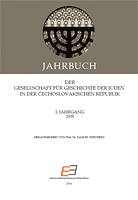
We kindly inform you that, as long as the subject affiliation of our 300.000+ articles is in progress, you might get unsufficient or no results on your third level or second level search. In this case, please broaden your search criteria.

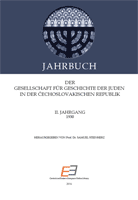
Der achtzigste Geburtstag Masaryks gibt Anlass zu dieser Studie. Sie soll ein soziologisches Präludium zur neuen čechoslowakischen Aufgabe der jüdischen Geschichtsschreibung sein. Die jüdische Geschichtsschreibung ist uneinreihbar. Sie hat keine Analogie. Aber Masaryks Werk ist ein Leitfaden für die Soziologie der außerordentlichen — hauptsächlich — der unterbrochenen Geschichte und ihrer Geschichtsschreibung.
More...
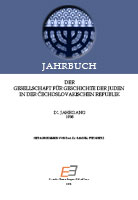
Among the thousands of tombstones from the 15th to the 18th century, the old Jewish cemetery in Prague contains a 1592 stone dedicated to Mardochai Kohen and his son Bezalel. The inscription on the tombstone dedicated to Mardochai reads: "Here lies a righteous, head and chief; he often obviated expulsions, gave up his life, moved to Rome, and convinced the pope to absolve the emperor from his oath." These words go far beyond the praise that is common in epitaphs. In succinct brevity, they describe Mardochai as a man who has done amazing things. He, a Jew of Prague, acted on the head of Christendom; he appointed the pope to discharge the emperor of his oath. Which pope and which emperor are meant here?
More...
Until the end of the 1820s, no special attention was paid to the question of settlement and population of Jews by the authorities. If we look at some random reports about the number of Jews in the cities, resp. rule districts, was the first official total conscription of Jews living in Bohemia, as far as it is known at least, made in 1618. However, this record cannot be described as an actual conscription in the modern sense of the word, since it cited neither the sex, nor the age and name of the Jews, but only recorded how many persons and families of Jews lived in that particular area. This count, which was apparently ordered for fiscal reasons to determine the total number of eligible Jews in Bohemia, occurred after the Thirty Years' War, when the anti-Semitic mood in the official Viennese circles in spite of frequent and urgent reminders of the Bohemian chamber with its peak reached the beginning of the reduction efforts, which for the first time clearly appeared on the Bohemian Diet of 1650.
More...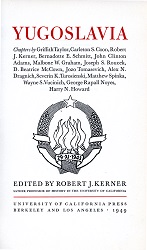
At the end of the First World War, when the Yugoslavs were finally united, one of the most serious problems facing the newly formed state was that of land tenure and agrarian reform. Almost 80 per cent of the population was engaged in agriculture, for industry had been only slightly developed in the sections formerly under foreign domination. Moreover, every degree of land reform or its total absence could be found. In the former Kingdom of Serbia, feudalism had been abolished when freedom from the Ottoman Empire was attained in 1833. Estates of Turkish landlords were confiscated without indemnity, and former Serbian serfs became peasant farmers in their own right. When additional territory was conquered from the Turks in 1878, confiscation of estates again took place, although this time the Turkish landowners were compensated for their loss.
More...
For centuries the territory of the South Slavs was a scene of conflict between the East and the West. Long and bitter religious disputes raged, with the Bogomils, the Eastern Orthodox, and the Roman Catholics struggling for dominance. the Ottoman Turks succeeded in conquering the entire Balkans by the end of the fifteenth century, the process of Islamization gradually extended over a large part of the Yugoslav lands. The Ottomans did not, for the most part, impose their faith on the newly conquered peoples, with the exception of boys taken into the janizaty and spahi corps. The Orthodox and Catholic churches suffered almost no hindrance in the exercise of their beliefs. But members of the Moslem faith were preferred for government positions and were given other favors by the government. As a result, many Yugoslavs went over to Islam. The nobility accepted Islam in order to preserve their privileged social position and wealth, to protect themselves from Turkish and Albanian attacks, and to escape the blood tax.
More...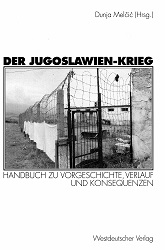
4.1. From Slavic Tribal Societies to Feudal Rule 4.2. Bosnia as part of the Ottoman Empire 4.3. The Austro-Turkish Wars and the collapse of the Ottoman Empire 4.4. The end of Ottoman rule and the occupation by Austria-Hungary 4.5. epilogue
More...
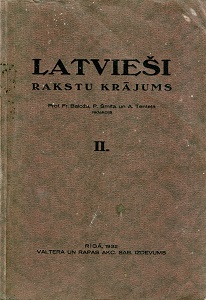
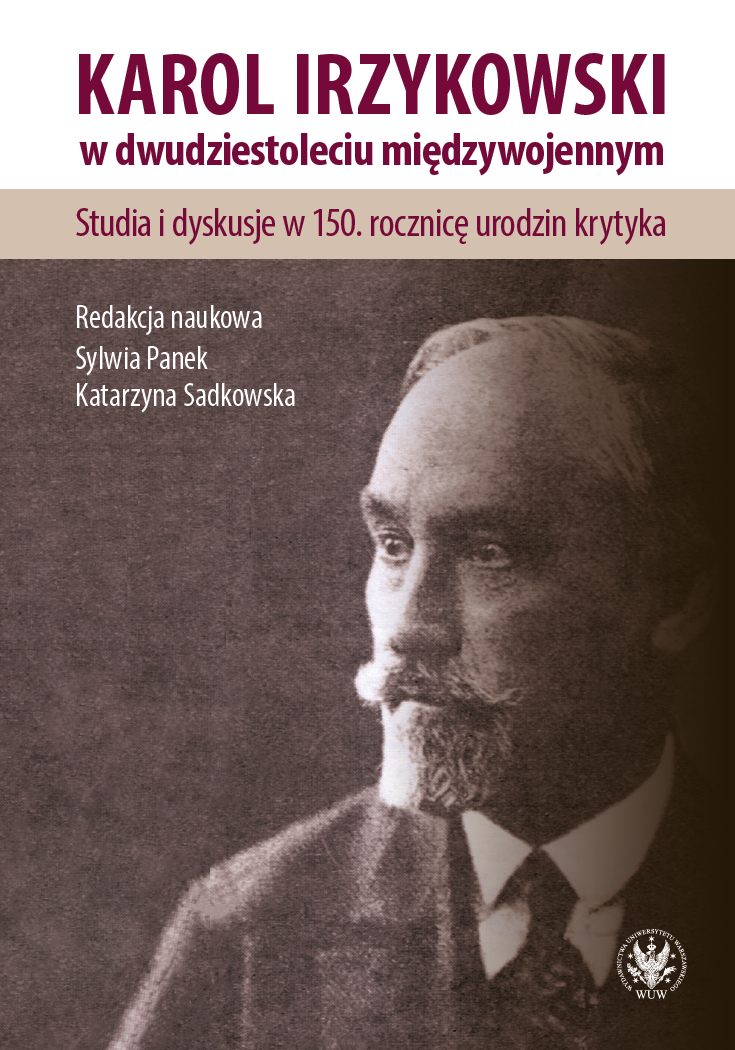
In the years 1919–1922 Karol Irzykowski cooperated with three literary magazines: “Skamander”, “Ponowa” and “Krokwie”. As a literary critic, he tried not only to get to know new poetic movements, but also to influence them. He believed that they were a continuation of avant-garde ideas and pre-war experiments in which he took part. Therefore, he used the common name of “The Young Poland” for the competing environments of “Skamander” and “Ponowa” and demanded from everyone an artistic awareness expressed primarily in programs. Irzykowski’s reaction to Skamandrites reluctant to formulate such programs was his famous article “Programophobia”; in “Ponowa” he appreciated programming tendencies, but had many objections to the practice of poets associated with it. Despite being a member of the editorial committees of both journals, he expressed reservations about them, which, in turn, provoked their authors to ironic reactions. The cooperation between Irzykowski and the magazine “Krokwie” looked different, promoting the direction created in pre-war Lviv – constructionalism. He hoped that “Krokwie” would allow him to develop his own works, which was not possible in “Skamander” or in “Ponowa”.
More...

The aim of the text is to delineate the relationship between Karol Irzykowski and the circle of Skamander literary group, established at the very beginning of the foundation of their monthly publication and lasting until Irzykowski’s death. The article includes an outline of the history of their collaboration and the disagreements that divided them, as well as an attempt to interpret issues such as ‘programophobia', ‘talentism’, civil courage, anti-Semitism, and ‘clerkism,’ focusing on their key points in particular.
More...

The paper aims at the analysis of selected critical statements Karol Irzykowski made about Stanisław Przybyszewski, a pivotal figure in the Young Poland’s movement at the turn of the twentieth century. Against the background of other changes that occurred in the 1920s in Irzykowski’s approach to literary figures he formerly criticized, one can observe Irzykowski assumes a lenient attitude towards Przybyszewski that results from recognition of essential similarities between their artistic credos dating back twenty-five years and a feeling of generational affinity in terms of experiencing emotions such as loneliness, disappointment, and anxiety. Irzykowski recognises Przybyszewski’s literary straightforwardness as well as the authenticity of his memoirs and his play "Mściciel" [The Avenger], and explores his older colleague’s art and critical comments made while taking down facts about the most recent history of Polish literature.
More...
The text is an analysis of the polemic that Karol Irzykowski conducted with Marxist literary critics in the interwar period in Poland. The author of the sketch, following the interpretation proposed by Tomasz Burek, tries to show that this is a dispute over what change in the literary field should look like: whether its main driver is the creative subject (as Irzykowski would have wanted) or perhaps the class struggle (as Marxists claimed).
More...

The article proposes an analysis of Karol Irzykowski’s Beniaminek (Benjamin, 1933), a study and an attack on the literary critic and translator Tadeusz Boy-Żeleński’s activity and writings as well as the reaction of the criticized author. The former’s work reveals to be rather an extensive defence of Irzykowski’s critical writings, and the latter’s answer – a pamphlet. Their dialogue (that didn’t take place) is situated in the context of Polish (and Central-European) cultural immaturity.
More...

This article synthesises information scattered in memoirs and academic texts: on Karol Irzykowski’s role in the press dispute of 1918–1929 over the drafts and statutes of institutions which were to organise literary life and protect the professional interests of writers (Polish Academy of Literature, Literary Chamber), and also on his work at the Polish Academy of Literature, which existed in the years 1933–1939. This information reveals Irzykowski’s dynamically changing views on the Academy, the drafts of which he reviewed, the statutes of which he first co-wrote and then rejected, and the establishment of the Academy into existence – which he received with resignation, but nevertheless accepted his own appointment to it. In the end, Irzykowski turned out to be the most committed, and at the same time the least respected by other academics, member of the institution.
More...